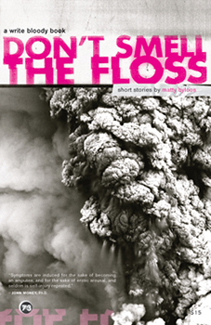
Generally, I think there’s a little too much of an us vs. them approach to self-publishing, and for self-publishers to truly become a part of the independent writing community, and earn the tag “indie,” people should embrace these new progressive publishing models.
This raises the issue of just what defines self-publishing. My definition is: someone who puts out their own books exclusively. As soon as that writer puts out another person’s book, it becomes a traditional press. By my own definition, this book is not self-published, but there’s a long tradition of independent presses starting with self-publication. I’ll name three that have also published my own writing: Soft Skull Press, founded by Sander Hicks, who published his own plays, Another Sky Press, which started with a novel, Click, by its editor Kristopher Young, and Cloverfield Press, a press that puts out short stories in single volumes, which published a story by its editor, Laurence Dumortier. Two Dollar Radio is another one.
In some sense, all these people are self-publishers because they put out their own books. If you want to be immediately taken seriously as a self-publisher, there’s a very good argument for putting out other people’s books as well. Obviously this adds an additional expense and workload. In short, I’d like to think that self-publishers have more in common with these types of publishers than not, so I’m giving it a platform. Also, Don’t Smell the Floss is great writing.

Matty Byloos: Well — this is an interesting question, and maybe more than one answer will develop over the course of the next year or two. As a musician, and one who did not do too much touring while I was in my last band, I don’t feel like a stranger to the concept of taking your material out on the road. In fact, I am really excited. I do work at a job in Los Angeles, so I’m guessing the quick weekend trips to local places (plane flights a part of this too), will be the bulk of my touring at first, with no major plans to do three weeks straight out on the road, at least not right away. Although I do think that would be a fun way to see the country.
Beyond that, more specifics — the family of writers on Write Bloody Press has been really great and very much in communication with each other, after a bunch of round robin emails started surfacing a couple of months ago. Many of us expressed the desire to support each other, and to offer to set up gigs in our home cities for other touring writers. Out of that conversation came the idea of setting up like an “Underground Railroad” of houses and apartments across the country. The idea is that a writer could show up say in Boston, or Brooklyn or Portland, find a Write Bloody author’s house, have a reading party thrown for them with a few local writers and a showcase for their own book, and meet 50 new people at a time. All of which sounds completely awesome to me.
SPR: You’re also a musician. Write Bloody almost seems to envision writers as musicians – as if reading is more of a solo performance than a writer reading a couple of pages. How has Write Bloody been like compared to working with indie record labels?
MB: Well, first of all I think you’re completely right on with your sense of WB and their relationship to musicians. I’ve had the pleasure of meeting and seeing a few of the authors in performance now — Derrick Brown himself, Mike McGee, others. They’re ridiculous. Seriously. It’s scary good. They take to the stage with such confidence, completely command the room, sweat, sing, pour emotions out of themselves, connect with the crowd, own the night. It’s daunting and inspiring — almost like watching a really superb comedian. And yes, Derrick and I have played music together and have followed each other’s musical projects a lot over the past several years. So there is naturally a lot of connection with music, and the idea of performance being as natural for writers as it is for musicians.
The beauty of working with Write Bloody is that as a writer and a creative person in general, I’ve felt just enough guidance from the press and from Derrick, who also has been totally great about giving up almost all of the creative control. Realizing this project has been as close to ideal as I could have imagined, and the end result, the book itself, is exactly as I wanted it. I can imagine that not too many other writers can say that when they’re dealing with large-scale publishing houses. Maybe horror stories abound, and are even the norm.
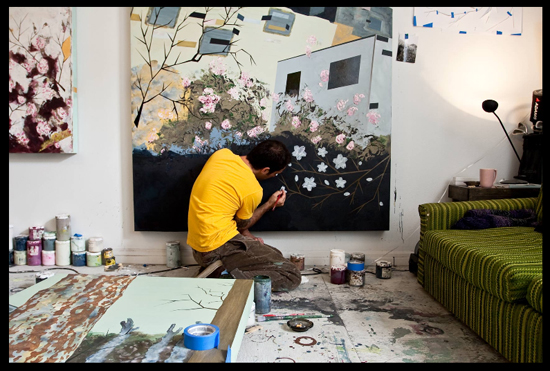
MB: Lots of also’s, right? Those either make things like this infinitely more difficult, or easier — I’m never sure. Hmmmm… A tough question too. I think my gut tells me that they’re all fairly independent impulses and that each satisfies a very different line of inquiry or expression. With painting, and maybe I’d say that I was a painter first if I had to rank them, there are so many layers of conceptual, cultural, historical or literary interest competing with a predominantly intuitive approach to image making and all its parts: color, surface, texture, light, space, etc. With writing, and this has almost always been the case, I can’t fold it into my painting directly but I also can’t just dismiss it as a hobby or passing pleasure. It’s a genuine form of artistic expression for me, like there’s a few people in my brain who have some things to say.
I think with writing, I definitely have an idea that is central to the work, and then work up the language in layers around it, or else construct miniature sections that all kind of (visually speaking) abut that main idea, exploring various parts of it, attempting to make something come together in an aggregate fashion. Very non-linear, very loosely related to traditional styles of fiction, or completely unrelated. And maybe that’s where there is some relationship to my painting practice — there is a central idea, or image, and then layers of material or various modes of painterly application all used to try to attack that idea.
With music, I think the drive for me has always been the very immediate sensation of presenting the material to an audience. It’s hard for me to feel a strong sense of immediacy when it comes to painting, and sometimes with writing — contrary to music. When a song is good, by which I guess I mean connecting with people, they know it right away, and have access to a language or a reaction to express that feeling of connection. Rhythm, a very bodily, sensate, immediate experience. When you play live and have it figured out, even if it’s just for a single song, you absolutely know it. The response is so much more mediated or delayed with painting, and maybe it’s equally hidden from me with regard to an audience of readers — because reading tends to be such an inherently private act.
They all have their plus sides, though.
SPR: How do you see promoting fiction vs. promoting your painting to the art world?
Well, certainly there’s the cost of the object to contend with. Paintings are expensive, and books are less than twenty bucks — so your audience starts out as being infinitely larger. This is of course when it comes to sales, I think. In theory, viewing paintings is free and buying a book is not (libraries or online reading excluded) — but the level at which you have to be in order to be showing in museums or in galleries doesn’t come easily and doesn’t often come early. So — all of that is just to say that the end goal of getting the thing into a home and in front of someone — the barriers between me and that goal are much greater with painting.
In terms of promotion, maybe the same kind of comparison as with sales. There are so many bookstores, many of them very welcome to whatever personal quality a writer can bring to their relationship with that store, or with the experience of doing a reading there. Maybe that’s it — promotion of a book seems to me so much more about getting personal, local, one on one with people. Reviewers, other writers, book store owners, bloggers, readers — you really get to reach out and make a personal connection with them. With galleries in the art world, you are essentially accessing them and then together, they take your work and marry it with their abilities, and that’s how you begin to connect with an audience. I think there’s a very basic, but substantial difference there. And I’m infinitely more fond of the idea of talking to people one on one.
SPR: Your writing’s filled with – I don’t want to say despair, because that sounds depressing – but certainly pathos, and some creepiness. What exactly are you trying to convey in these stories, what’s the reaction you’re looking for?
MB: Writing for me has been an exercise in therapy, without wanting to sound reductive or dismissive about the stories. I don’t share a lot with people — it’s never been my style. But in the writing, I guess I tend to share everything; it’s just masked and skewed and filtered through a very very weird, perverse universe of characters who seem to play out human dramas, but underneath so many layers of oddity.
Creepy, for sure. But in my opinion, they read as creepy first on the surface — a story about a person with an unnatural and unrelenting desire to cut off an otherwise healthy limb for the sake of sexual gratification or the realization of personal identity is certainly creepy. But I think that goes away fast, or else our obsession with and attraction to death and destruction takes over and makes that initial creeped-out reaction go away. Then — the characters I create are just like us — they’re not really that creepy emotionally. I mean, they’re confused, they’re sad, they’re searching — but in those emotional states, they’re very real, easily identifiable people.
So maybe what creeps people out about the work then is this secondary or tertiary reaction — we realize that there is a lot of ourselves, seemingly “normal” people in these very strange characters, and we have to grapple with that realization of our identity being not so clean, or untainted. The reaction I’m looking for? I think a lot of planetary problems would go away really quickly if we all slowed down a little bit and took some time to realize how much more alike we are than different.
SPR: What’s your writing regimen? These aren’t heavily plotted stories, but they don’t need to be – they’re about people’s lives, some lives you’ve probably never read before – like an amputee fanatic. How does the writing process for these stories unfold?
MB: Yeah I’ve never felt too compelled to attack plot in a straightforward way — maybe I don’t go through life that way, so it doesn’t seem natural. I write a lot, procrastinate a lot. When I’m knee deep in a story, though, I’ll write like a page in a day, which doesn’t amount to much in my estimation, but the process is very labored for me. When I return to the story the next day, I’ll read through the first page, thoroughly editing every single sentence until I’m writing new material on page two, if that makes sense. The effect of writing in this mostly editorial process is that language gets worked up into a very dense knot; descriptions are layered and slightly mannered and maybe baroque. Double, triple meanings, very taut language. Then maybe when I insert a very different kind of sentence — something punchy, or sloppy, or terse or tossed off — it really stands out and has the jarring quality that I want it to have.
So the writing process usually starts with an idea — let’s take the amputee fetish for example again — of something out in the world that catches my eye. Maybe we all ultimately are reducible to the baby and the shiny object that attracts its attention, and not in a pejorative way. So then I research, which is a real passion of mine — interrogating a subject and mining for information. I try to match it up to an analogue event in my life. At that time, I’d just broken up with a girl and neither of us really understood exactly why. There was something directly related to our personal situation in the way these paraphiliacs talked about their desires to remove their legs. So it made sense to me to create the same relationship between the severed leg and the paraphiliac, as existed between me and my ex at the time. I felt a kinship with these people — shared emotional states. Their situation and my research into it and understanding of it helped me to understand my own situation, however perverse that may sound. I went through what I mentioned earlier in that identifying bits of my characters in myself, and realized during my research that we all share similar states of being, maybe some of us just get slightly more derailed in our lives.
SPR: Over how long a period were these stories written? You ran the literary zine Smalldoggies. Are these stories from that period? How has your writing changed since you started that zine in 2001 and did that factor into how the stories are ordered in this collection?
MB: I started the stories in graduate school, around 2000, and continued until about a year ago. But even in the last year, during the massive editing process that went into this project, I was seriously overhauling a lot of this work after having put it down for many years. I have saved all my copies of stories (with other people’s comments) from years of workshops, and went through all those notes to revise the work again and again. Parts of some stories were removed and attached to others. I worked with an editor, Keion Moradi, on my side, and another 2 or 3 people from Write Bloody. I think this is the first book of short fiction to come out on the press if I’m not mistaken, and we all wanted to create something that really worked.
I did run Smalldoggies, which was both a blessing and a curse. Some of the stories originated back then, or had an early incarnation, definitely. The story about the skunk who comes into the copywriter’s life a bit like a wizened old Yoda or Lao Tzu spiritual master, was started back then, but changed a bunch with edits in the last year. That’s one of the stories that had an entirely new and foreign section grafted onto it after I took it out of a different story. I think I’ve probably evolved as much as anyone does between late twenties and early thirties, so with any luck the writing evolved along with that personal development. Who knows though. Maybe I got more skewed in my perspective, and maybe that’s not really such a bad thing either.
As far as story order is concerned, I sat with the stories a lot in the last year, throughout all the editing. They seemed naturally to fall into two categories: things that dealt with love, and things that tipped over the edge a bit into other-worldly realities, like dreams maybe. Within those two sub-sections in the book, the stories are completely out of chronological order, which I kind of like.
SPR: Do you see yourself working on a novel in the future, or are you mainly attracted to the short story?
I think so. A novel seems daunting, and maybe a project for a time when my life feels a bit slower in general, but I also tend to think of it as a terrific formal challenge. As is the case with short fiction, there are certain “rules” to follow with a novel — but by the same measure, there are a ton of them to break, which always sounds attractive to me. I’d like to find a character who was interesting enough to make me want to follow him or her for 300 or more pages, and I can see that kind of project including all sorts of things: emails, letters, lists, drawings, photographs — a real multi-sensory experience.
I read Austerlitz this last year, and really was attracted to how the photographs carried the narrator from one scene or city to the next. I’d be very happy to start someplace like that. For now, I love the short story form. In some ways, maybe this is my early influence from Barthelme, of whom I’ve always been a huge admirer. The basis of the story seems to be sometimes so far out there, that the construct of the piece of fiction can only go on so long before it falls apart. So I don’t think about it like fighting a fire, where the action of the “plot” or “event” can only take place within a limited amount of time — but I do feel like the time I can spend with the characters I invent is shorter than the space of a novel, and more of a challenge to get what I want to happen into 15 pages or less.
Strangely enough, the character in the story “My Friend the Pornographer”, maybe both of those characters in that story — I could see following him (them) through more pages than just a work of short fiction. Maybe because I’m still trying to figure him (them) out.
SPR: What are your thoughts on self-publishing? This is, after all, a self-publishing site, and I could see some thinking this crosses the line too much into traditional publishing, even if the marketing tactics are similar to self-publishing, and even if the editor of Write Bloody puts out his own books. But it’s not like you’re putting this out on Lulu, you’re sharing a press with support from other writers. So that gives you a unique perspective on self-publishing than someone who’s been “forced” to self-publish. That’s a long way of asking, do you see self-publishing as legitimate and would you ever do it yourself?
MB: I come at just about everything from my initial and early love of punk rock, so I am a huge supporter and believer in the do-it-yourself methodology. I don’t think it needs to be legitimized, I think it is by default. If a person is creative, wants to bother making something, wants their voice out in the world beyond its natural vocal range and reach, then go for it. Make the work, operate outside the system because it can and should be done, and get the work out into the world. Blah blah Internet, yes, but really — take the cue from the music industry. Make the work because you love it and because you have no other choice, not because you want accolades from the mainstream, and let it take on a life of its own in the world. Use the Internet as a vehicle — take advantage of social media and blogging, build and earn a reputation, and combine real-world presence with what you can get out of being online.
Write Bloody I think is a perfect hybrid for someone like me — I get just enough support from a creative family, but one that has its priorities and values in alignment with mine. They expect and require me to take my own do-it-yourself enthusiasm to the project, and make it what it will eventually become. And yes — in a nutshell — I can see myself publishing something on my own in the future. Totally. I am completely behind what Derrick is doing and feel very similar: he wants his work out in the world, wants to do it on his own terms, but also wants to provide that opportunity for other writers and works of poetry and fiction that he loves. I wish more people were like him, in fact.
SPR: Thanks, Matty. Good luck with the book release.
Get an Editorial Review | Get Amazon Sales & Reviews | Get Edited | Get Beta Readers | Enter the SPR Book Awards | Other Marketing Services



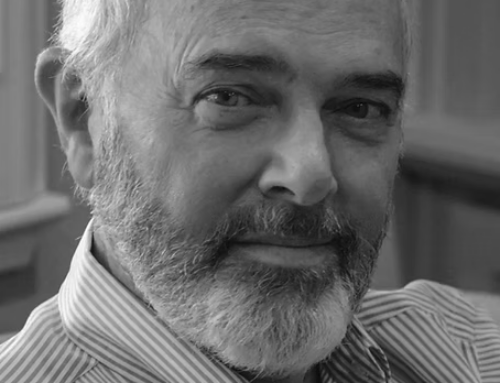









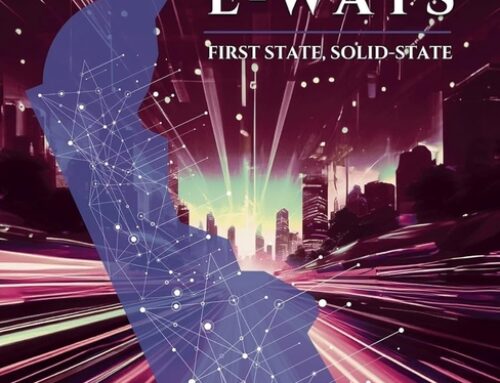




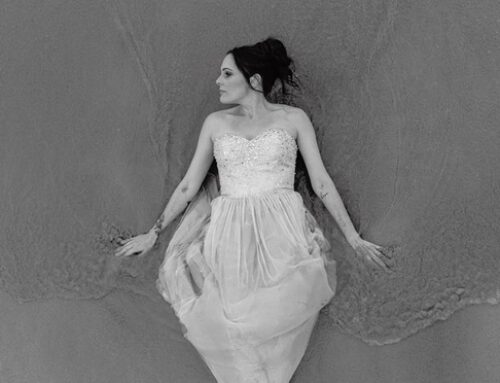
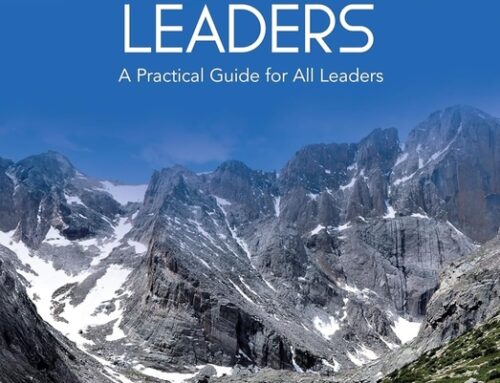
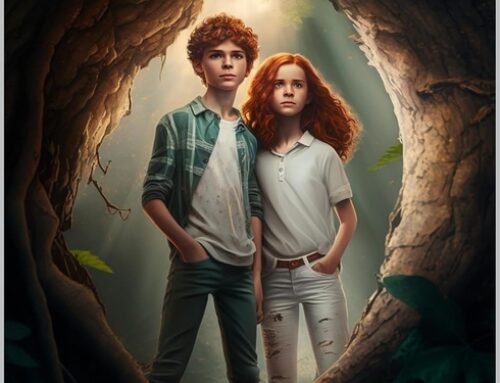

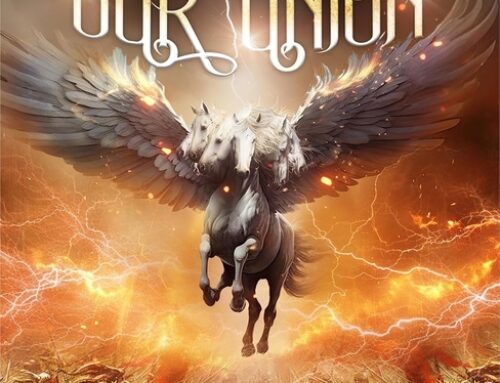
Great Quote: “I come at just about everything from my initial and early love of punk rock, so I am a huge supporter and believer in the do-it-yourself methodology. I don’t think it needs to be legitimized, I think it is by default. If a person is creative, wants to bother making something, wants their voice out in the world beyond its natural vocal range and reach, then go for it.”
Love that.
Also, really kickass painting up there. I used to paint a little but haven’t in forever. As far as music the only thing I know how to play is the radio and my ipod.
This encapsulates my philosophy perfectly and is exactly what we’re trying to achieve with Blade Red Press. Great article!